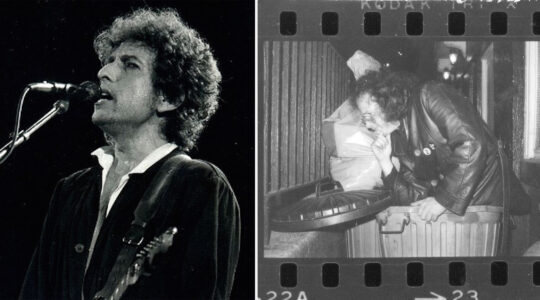With its overarching message of freedom and redemption, Passover seems better suited to America than any other Jewish holiday. And one of the most striking aspects of Passover in this country is the appeal that it has for non-Jews, especially African-Americans
, who have found many parallels to their own experience of liberation from bondage. In Matthew Lopez’s suspenseful, searing new play, “The Whipping Man,” which opened this week at the Manhattan Theatre Club, a unique celebration of Passover in the South just after the Civil War triggers a re-examination of the horrors of slavery in America.
The play, directed by Doug Hughes, opens memorably with a wounded Jewish Confederate veteran, Caleb (Jay Wilkison), returning home to a nearly evacuated Richmond by crashing through the door in the middle of a heavy downpour. Two of his former slaves, middle-aged, avuncular Simon (André Braugher) and young, devil-may-care John (André Holland), are still living in the house, which has been ravaged by fire. The slaves, who have been raised as Jews, continue to celebrate the Sabbath and Jewish holidays even as their former master, traumatized by war, feels that he has lost his own faith.
At the end of the first act, Simon must amputate the soldier’s leg below the knee in order to save him from dying of gangrene — a spectacle that the audience is mostly, although not entirely, spared. This cutting away, a kind of symbolic circumcision, becomes the prelude for much that is rotten that will need to be exposed before these characters reach a true, devastating reckoning of each other’s evils in the context of a climactic Passover seder.
As the shadow of the past progressively blots out the light of the present, the characters in “The Whipping Man” learn, as the singer Kris Kristofferson puts it, that freedom is “just another word for nothing left to lose.”
Lopez, who is Puerto Rican and openly gay, comes from a family of Civil War buffs. He noticed that Passover began in 1865 on the day after General Robert E. Lee’s surrender at Appomattox. In writing “The Whipping Man,” which has been performed at the Old Globe in San Diego and at other major regional theaters, Lopez found deep resonances between Jewish heritage and African-American experience.
Beyond a crackling script and a realistically dilapidated set by John Lee Beatty, much of the raw power of “The Whipping Man” derives from the pitch-perfect performances of the three actors.
As the wounded Caleb, Wilkison is entirely convincing in showing how excruciating physical pain can be magnified by the even greater psychic pain of overwhelming guilt and fear. Braugher, who starred in the film “Glory,” is haunting as the pragmatic, nurturing and wise caretaker of the household who is shattered when he has to come to terms with the greatest betrayal of all. And Holland, who was a stand-out in the recent Broadway revival of August Wilson’s “Joe Turner’s Come and Gone,” is dead-on in his portrayal of a character who hides his own terrible secret under a thin veneer of carelessness and faux sophistication, signified by his fondness for “liberating” fancy clothes, furnishings and food from other people’s homes.
It makes sense, given the unusual circumstances of their upbringing, that the black characters in the play are terribly confused about their identity. “Were we raised as slaves, or as Jews?” John asks at one point, noting that the ancient Hebrews took the “heathens” from around them as their own slaves. Caleb’s tyrannical father stopped him from learning the alphabet, so John had to teach himself to read. Celebrating Passover as free men, Simon recognizes, gives them the opportunity to turn what had always been a cruel joke on their enslavement into a true celebration of the emancipation brought by the heroic late president he reverently calls “Father Abraham.”
If only moving on from a legacy of torture and humiliation were so simple. When he takes off his shirt to show the horrific scars of Caleb’s “family tree” that are “engraved” on his back from the whip, it seems impossible that anything could ever be made right. As Simon sings the Negro spiritual, “Go Down, Moses,” and holds the hands of his two companions at the seder, he wills himself to believe that the evils of the past can be left behind. But celebrating Passover with his former white master, he learns, is like having a seder with Pharaoh at the table.
Simon notes that the original seder was an “improvised” affair, and so, most jubilantly, is his, given that he has had to assemble the symbols of the holiday from hardtack, a bone from Caleb’s horse, collard greens and an actual brick. The seder scene echoes an earlier, essentially comic, scene in the play in which the characters sit down to a Shabbat dinner of Caleb’s dead horse, with the horse meat so tough that John quips that it takes longer to chew it than the animal was alive.
By contrast, the seder scene is fraught with dread, as the audience waits for the characters’ explosive secrets to be revealed. And when they are, this masterful production suggests, nothing will ever be the same — not for them and not for the nation that is struggling to redeem itself from the horrors that it has perpetrated.
“The Whipping Man” is hard to shake from one’s mind.
“The Whipping Man” runs through March 20 at the Manhattan Theatre Club, City Center Stage I, 131 W. 55th St. Performances are Tuesday and Sunday evenings at 7 p.m., Wednesday through Saturday evenings at 8 p.m., and weekend matinees at 2 p.m. For tickets, $80, call CityTix at (212) 581-1212 or visit www.nycitycenter.org.
The New York Jewish Week brings you the stories behind the headlines, keeping you connected to Jewish life in New York. Help sustain the reporting you trust by donating today.




